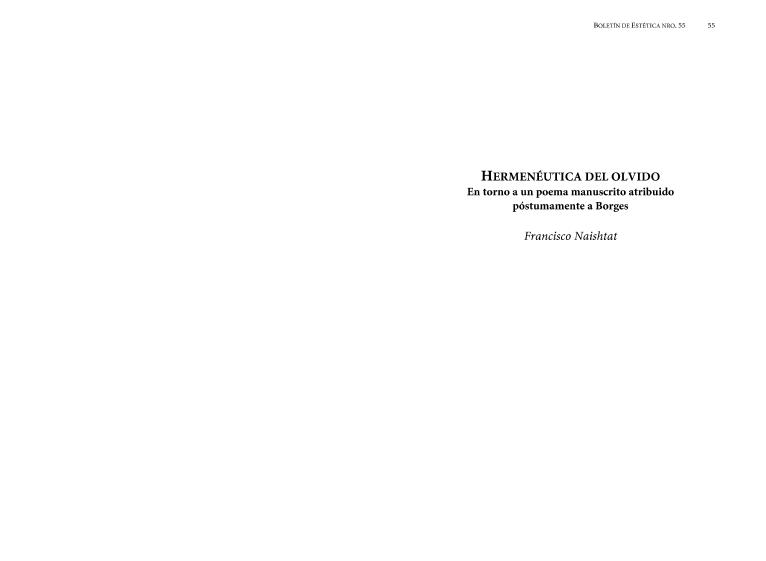Mostrar el registro sencillo del ítem
dc.contributor.author
Naishtat, Francisco

dc.date.available
2022-08-18T16:08:46Z
dc.date.issued
2021-08
dc.identifier.citation
Naishtat, Francisco; Hermenéutica del olvido: En torno a un poema manuscrito atribuido póstumamente a Borges; Centro de Investigaciones Filosóficas. Instituto de Filosofía "Ezequiel de Olaso". Programa de Estética y Filosofía; Boletín de Estética; 55; 8-2021; 55-73
dc.identifier.issn
2408-4417
dc.identifier.uri
http://hdl.handle.net/11336/166026
dc.description.abstract
Este artículo parte de un poema manuscrito atribuido póstumamente a Jorge Luis Borges, titulado “Aquí. Hoy” y editado por el crítico colombiano Abad Faciolince. Sin entrar en el problema de la autenticidad de este poema, lo que interesa es su argumento metafísico en conexión con lo que se caracteriza aquí como una “hermenéutica del olvido”, convocando a Paul Ricœur, Friedrich Nietzsche, Jean-Paul Sartre, Martin Heidegger, Walter Benjamin y otros filósofos que inauguraron una reflexión sobre el olvido con raíces fenomenológicas, ontológicas, antropológico-existenciales e históricas. En particular, el autor polariza un pensamiento (in)existencial del olvido a través de la noción de Nachleben con la que Benjamin, en su obra temprana, aborda la temática de la ruina y la espectralidad.
dc.description.abstract
This paper is based on a handwritten poem posthumously attributed to Jorge Luis Borges, entitled “Here. Today”, and edited by the Colombian critic Abad Faciolince. Without going into the problem of the authenticity of this poem, what interests is its metaphysical argument, in its connection with what is characterized here as an “hermeneutics of forgetting”, summoning Friedrich Nietzsche, Jean-Paul Sartre, Martin Heidegger, Walter Benjamin, and other philosophers who have inaugurated a reflection on the forgetting with phenomenological, ontological, anthropological-existential, and historical roots. In particular, the author polarizes an (in)existential thought of forgetting through the notion of Nachleben with which Benjamin, in his early work, approaches the theme of the ruin and the spectrality.
dc.format
application/pdf
dc.language.iso
spa
dc.publisher
Centro de Investigaciones Filosóficas. Instituto de Filosofía "Ezequiel de Olaso". Programa de Estética y Filosofía
dc.rights
info:eu-repo/semantics/openAccess
dc.rights.uri
https://creativecommons.org/licenses/by-nc-sa/2.5/ar/
dc.subject
MUERTE
dc.subject
MEMORIA
dc.subject
PASADO
dc.subject
FUTURO ANTERIOR
dc.subject.classification
Otras Filosofía, Étnica y Religión

dc.subject.classification
Filosofía, Ética y Religión

dc.subject.classification
HUMANIDADES

dc.title
Hermenéutica del olvido: En torno a un poema manuscrito atribuido póstumamente a Borges
dc.title
Hermeneutics of oblivion: Around an unpublished poem posthumously attributed to Borges
dc.type
info:eu-repo/semantics/article
dc.type
info:ar-repo/semantics/artículo
dc.type
info:eu-repo/semantics/publishedVersion
dc.date.updated
2022-08-16T18:11:11Z
dc.journal.number
55
dc.journal.pagination
55-73
dc.journal.pais
Argentina

dc.journal.ciudad
Ciudad Autónoma de Buenos Aires
dc.description.fil
Fil: Naishtat, Francisco. Consejo Nacional de Investigaciones Científicas y Técnicas; Argentina. Universidad de Buenos Aires. Facultad de Ciencias Sociales. Instituto de Investigaciones "Gino Germani"; Argentina
dc.journal.title
Boletín de Estética
dc.relation.alternativeid
info:eu-repo/semantics/altIdentifier/url/https://boletindeestetica.com.ar/index.php/boletin/article/view/257
dc.relation.alternativeid
info:eu-repo/semantics/altIdentifier/doi/https://doi.org/10.36446/be.2021.55.257
Archivos asociados
